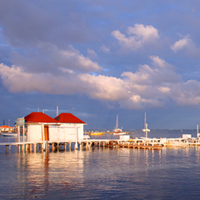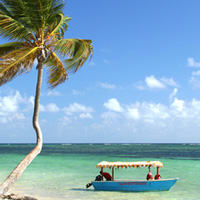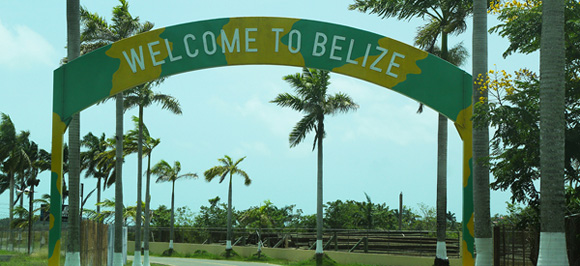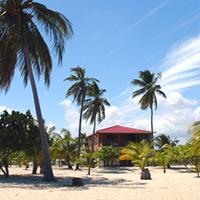Belize
Coastal BeachesBelize is a small country located on the northeastern coast of Central America, bordered by Mexico to the north, Guatemala to the west and south, and the Caribbean Sea to the east. With its diverse culture, rich history, and stunning natural beauty, Belize is a unique destination that offers a blend of Caribbean and Central American experiences. The official language is English, a legacy of its British colonial past, making it an accessible destination for English-speaking tourists. Belize is known for its vibrant biodiversity and distinctive ecosystems. The Belize Barrier Reef, the second-largest coral reef system in the world, is a UNESCO World Heritage Site and a paradise for snorkeling and scuba diving enthusiasts. The country's landscape ranges from tropical rainforests and savannas to coastal wetlands and the Maya Mountains in the south. Belize is also home to numerous ancient Maya archaeological sites, such as Caracol, Xunantunich, and Altun Ha, which offer a glimpse into the region's pre-Columbian history. The population of Belize is ethnically diverse, including groups such as the Mestizo, Creole, Maya, and Garifuna, each contributing to the country's rich cultural tapestry. Belizean cuisine reflects this diversity, with dishes that incorporate a mix of Caribbean, Mexican, and Maya flavors. Despite its natural and cultural attractions, Belize remains less touristy compared to its Central American neighbors, offering a more laid-back and authentic experience. The country's economy is based on tourism, agriculture, and fisheries, with a growing interest in eco-tourism and sustainable practices. Belize's small size and low population density contribute to a sense of intimacy and community, with locals often displaying warmth and hospitality to visitors. The pace of life is generally relaxed, with an emphasis on enjoying the natural surroundings and cultural heritage. Whether exploring ancient ruins, relaxing on a sun-soaked beach, or trekking through lush jungles, Belize offers a unique blend of adventure and tranquility.
 SJB Global
SJB GlobalConnect
SJB-Global is a top-rated financial advisory firm specializing in expat financial advice worldwide, offering retirement planning & tax-efficient solutions with a regressive fee model. Our clients benefit from their country’s most favorable tax environment by utilizing the efficient investment vehicles we offer. Our commitment to quality service is reflected in our stellar reviews, with over 300 testimonials boasting 95% five-star ratings.
Click connect to have our partner contact you via e-mail and/or phone.
 SJB Global
SJB GlobalSJB-Global is a top-rated financial advisory firm specializing in expat financial advice worldwide, offering retirement planning & tax-efficient solutions with a regressive fee model. Our clients benefit from their country’s most favorable tax environment by utilizing the efficient investment vehicles we offer. Our commitment to quality service is reflected in our stellar reviews, with over 300 testimonials boasting 95% five-star ratings.
Connect
Click connect to have our partner contact you via e-mail and/or phone.
Living in Belize
Best Places to Live in Belize
Visa & Residency
Obtaining a residency in Belize is a process that can be considered average in terms of difficulty. There are several residency options available for expats, including the Qualified Retired Persons (QRP) Program and Permanent Residency. The QRP Program is designed for retirees who wish to live in Belize and can demonstrate a consistent income of at least $2,000 per month from a pension or annuity. Applicants must be 45 years or older and are allowed to import personal goods into Belize tax-free. This program is quite popular among retirees due to its benefits and relatively straightforward application process. For those who are not retirees, Permanent Residency is an option. To apply for Permanent Residency, an individual must have legally lived in Belize for one year without leaving for more than 14 consecutive days. The process involves submitting various documents, such as a police record, health certificate, and proof of income or savings. Once granted Permanent Residency, individuals have the right to work in Belize without a work permit. Digital nomads often use the standard Tourist Visa, which is valid for 30 days. This visa can be extended for up to six months by applying for extensions at the Department in Belize. While this is not a long-term residency visa, it allows digital nomads to live and work remotely in Belize for a limited period. The process for obtaining residency can be bureaucratic and may require patience, as it involves multiple steps and interactions with government officials. However, compared to some other countries, Belize offers a more streamlined and expat-friendly process, especially under the QRP Program. It is advisable for potential expats to consult with a local attorney or a service provider that specializes in Belizean immigration to ensure all requirements are met and to navigate the application process more efficiently.
Healthcare in Belize
Belize's healthcare system is a mix of public and private services. The public healthcare system is accessible to all citizens and legal residents, including expatriates who have obtained residency status. It is funded by the government and offers services at low or no cost. However, the quality of public healthcare can vary, with urban areas typically having better facilities and more resources than rural areas. The country has several public hospitals and many health centers and clinics. Private healthcare in Belize is known for providing higher quality services with more modern facilities and shorter wait times. It is more expensive than public healthcare and is often used by expats and those who can afford private insurance or out-of-pocket payments. Expats and digital nomads can access public healthcare once they have legal residency or, in some cases, by paying directly for services. It is advisable for expats and digital nomads to have health insurance that covers medical treatment in Belize.
Cost of Living
The cost of living in Belize is considered moderate. While some goods and services may be more expensive due to importation costs, overall, the cost of living can be affordable, especially when compared to North American and European standards.
Weather
Belize features a tropical climate with a wet and dry season. The wet season runs from June to November and can include heavy rainfall and occasional hurricanes. The dry season spans from February to May, offering warmer temperatures and less precipitation. The coastal regions tend to be more humid, while the inland areas can experience slightly cooler temperatures at night.
Educational System in Belize
The educational system in Belize is influenced by the British system, as Belize was formerly a British colony known as British Honduras. Education in Belize is mandatory between the ages of 6 and 14, which covers the eight years of primary education. The school year in Belize typically starts in September and ends in June, with breaks for Christmas and Easter, as well as a summer break. Primary education is divided into two cycles: the Infant Division (ages 6-8) and the Standard Division (ages 9-14). After completing primary school, students sit for the Primary School Examination (PSE), which determines their placement in secondary school. Secondary education lasts for four years, and students are typically between the ages of 14 and 18. The secondary schools are often called high schools, and they culminate in students taking the Caribbean Secondary Education Certificate (CSEC) exams. Belize also has tertiary-level institutions, including junior colleges offering two-year associate degree programs. The quality of education in Belize varies, with private and denominational schools generally having better resources and outcomes than public schools. For expatriate families, there are international schools that offer curricula from other countries, such as the United States or United Kingdom, and these can be an option for those seeking an educational experience similar to what they have at home.
Universities in Belize
The university system in Belize is relatively small but growing. The main institution of higher education is the University of Belize, which offers a range of undergraduate and graduate programs. There are also a few other tertiary institutions, such as Galen University and St. John's College Junior College, which offer various degree programs. The academic year at Belizean universities typically starts in August and ends in May, with breaks in between semesters. Undergraduate degrees usually take four years to complete, while associate degrees take two years. The curriculum is often based on the British system, but with adaptations to suit the local context. For international students, the experience of studying in Belize can be unique due to the country's diverse cultural influences and its natural environment, which is rich in biodiversity. The cost of attending university in Belize is generally lower than in many other countries, especially when compared to institutions in the United States or Europe. However, international students should be aware that while tuition fees are more affordable, they may need to budget for additional costs such as travel, accommodation, and living expenses. English is the official language of instruction, which can be an advantage for students from English-speaking countries.
Copyright 1997-2025 Burlingame Interactive, Inc.













